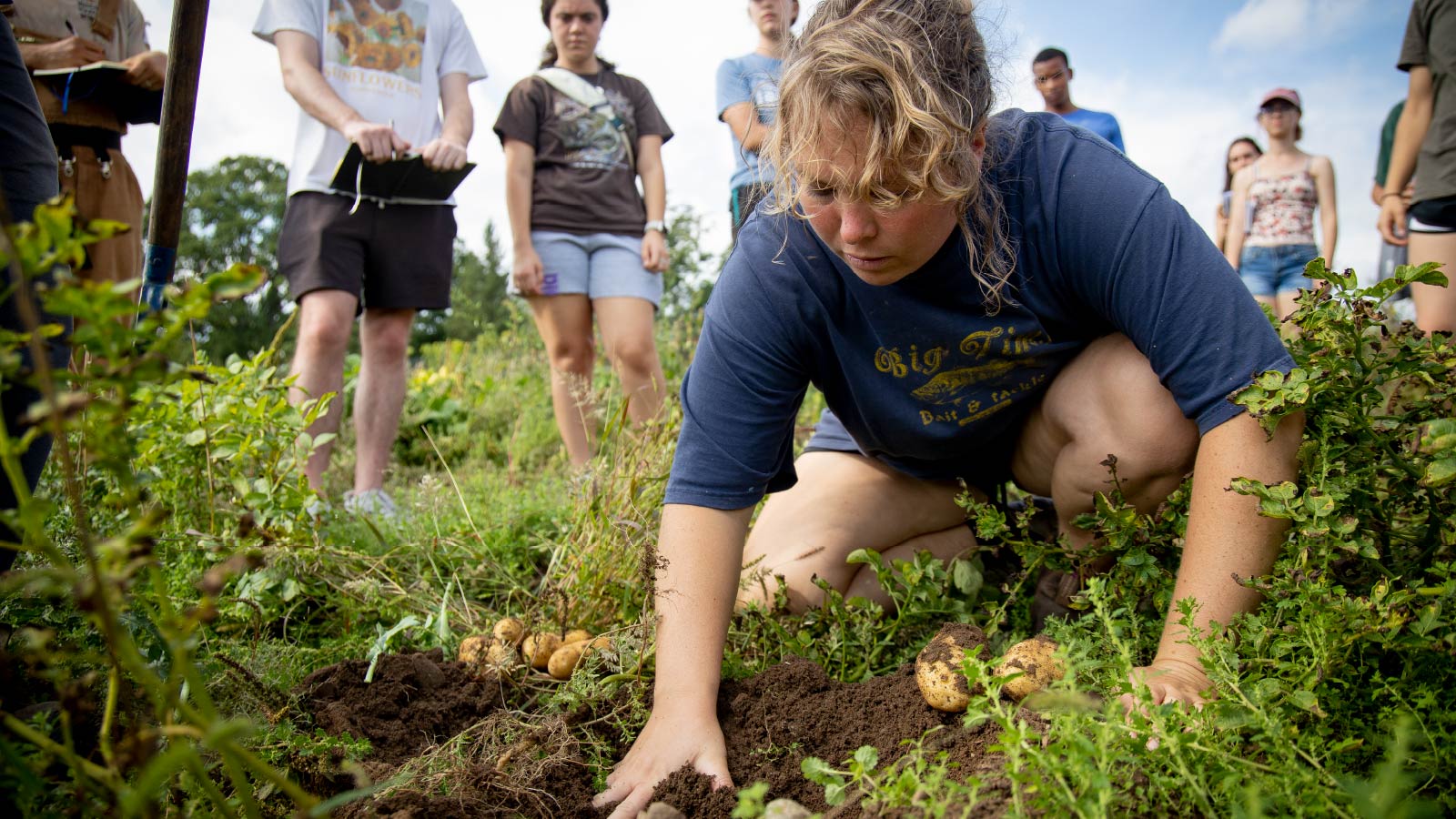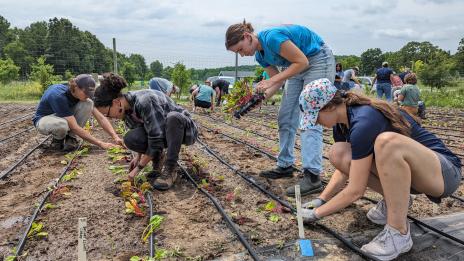By Eric Gallippo | Photos by Marc-Grégor Campredon and Kaley Joy
Jenna Jarjoura grew up fascinated with the natural world. But it wasn’t until she took the University of Michigan’s Campus Farm course that she had the chance to get her hands dirty growing and harvesting her own food.
“It was probably the best part of my week, even though, at times, it was like, ‘I'm so sweaty,’ or ‘I feel so gross right now,’ because that was the first time that I've ever been on any sort of garden or farm,” Jarjoura (Taubman College Class of 2025) recalled.
Located at U‑M’s Matthaei Botanical Gardens, the Campus Farm was started by students with the dual purpose of addressing food security on campus and establishing a living-learning lab for sustainable growing practices.
“The students doing the work at the farm feel it's just a great component of the mission and vision work that we're doing around food access that is focused on building a more sustainable and just food system on campus,” said Program Manager Jeremy Moghtader (BS ’98, MS ’04). “They're the ones setting and driving the tone.”
Growing the program
Initially, the goal was to get local, organically grown produce into campus dining halls. It was a real challenge that took a lot of work—and once it was accomplished, Moghtader said it was clear there was more to do.
“Students realized only a certain percentage of people accessed their food through the residence halls,” Moghtader said. “So the question became, ‘How do we do more with getting this produce to more students?’”
One effort to change that has been the Farm Stand, which the farm co-leads with the U‑M Sustainable Food Program in Student Life Sustainability and sets up weekly on the Diag behind the flag pole to sell fresh, discounted produce for most of the fall semester.
Jarjoura started her U‑M career as an environmental science major before switching to architecture. Connecting with the farm was a way to get back in touch with her environmental roots. Following the class, she interned at the farm—“the best summer of my life,” she said—before becoming its farm stand and food access manager.
“It's a very positive thing to sell the produce that you put in the ground, took care of, see as your baby, and then harvest it and bring it to Central Campus for people to enjoy,” Jarjoura said.
From farm to cupboard
To get even more food into the hands of students, Campus Farm started donating surplus produce to U‑M’s Maize and Blue Cupboard. Another student-founded effort to address food security on campus, the cupboard was launched with donor support in 2012 as a food collection and distribution service. In 2019, it opened the doors to its public storefront attached to the Betsy Barbour Building, where students, faculty, and staff can shop for free supplemental groceries and personal care items without any proof of need.
Director Kelly O’Mara said the cupboard continues to grow each year; in fall 2023, it served around 800 shoppers per week. The cupboard also offers emergency outreach bags at locations across campus, including advising offices and libraries, and pop-up distributions at the Northwood Community Center and North Campus.
Fresh feels better
More recently, Campus Farm students surveyed cupboard users to better understand their needs; high on the list of requests were more culturally inclusive foods such as ginger, garlic, and bok choy, O’Mara said. And the cupboard now receives order sheets for produce from the farm, just like the dining halls.
O’Mara said this change makes a big difference, since the cupboard relies heavily on donations from food banks and options and quality can be limited.
“To get really beautiful, freshly harvested stuff from the farm feels really good, and we always try to note that this came from the farm, so people can find it,” she said. “They're excited to have stuff that's local, that's traceable and identifiable, and then the quality is a lot better.”
Making a difference on campus—and beyond
Donors are making a difference for both programs.
Beyond support for food and overhead costs, donors recently helped purchase a new freezer and coolers, updated shopping baskets, and other equipment that keeps the storefront running smoothly and professionally.
At the farm, interns in donor-sponsored positions are working with urban farms in Detroit and elsewhere in Southeast Michigan to share knowledge and hone skills they will take with them after graduation. Moghtader said the farm also provides 20,000 produce transplants to be grown in Detroit. In Ann Arbor, donors have helped fund a collaboration between the farm and Michigan Engineering to develop on-site solar power for coolers and charging its electric delivery vehicle.
To Jarjoura, the farm and its collaborations with efforts like Maize and Blue Cupboard are about building an inclusive community around food, on campus and beyond.
“It's just so important to me, because I've learned so much,” she said. “You can't unlearn the importance of healthy produce or healthy food once you have that knowledge, and I just want everyone to know about it.”








